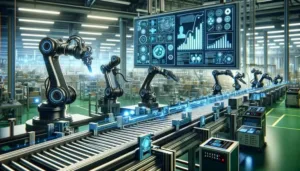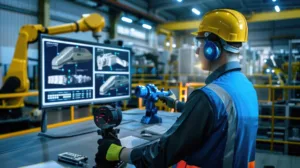When you purchase through links on our site, we may earn an affiliate commission. This doesn’t affect our editorial independence.
The manufacturing sector has always benefitted immensely from innovations in technology. Now, artificial intelligence (AI), the latest significant technological innovation is stepping into the spotlight, promising to revolutionize how factories operate. With the fourth industrial revolution in full swing, manufacturers who ignore using AI in manufacturing risk falling behind.
Read this article if you want to get more insight into the ways AI can help you improve as a manufacturer. We’ll break down:
- How AI is transforming manufacturing today.
- Real-world AI applications that are already in use.
- The biggest benefits (and challenges) of AI adoption.
- Emerging trends shaping the future of smart factories.
Let’s dive in…
How AI is Reshaping Manufacturing
AI isn’t just another tech buzzword—it’s already making waves in factories worldwide. Manufacturers are focusing on three key areas where AI delivers the most impact:
1. Data & Insights:
Manufacturers collect mountains of data—personnel information, invoices, machine performance, supply chain logs, quality checks etc. But making sense of it all is a challenge. That’s where AI steps in.
- Machine learning analyzes data faster than any human, spotting inefficiencies and predicting failures before they happen.
- Predictive analytics helps factories optimize maintenance schedules, reducing costly downtime.
According to one survey, companies that use AI extensively outperform their peers.
2. Smarter Decision-Making
The past few years have been challenging for most manufacturers. Many have grappled with challenges in the supply chain, shortages in skilled labor, and unpredictable demand. Having a source that can provide you with data-backed decisions will offer you a competitive advantage.
- AI analyzes trends and suggests actions (e.g., rerouting shipments, adjusting production schedules,).
- It spots hidden patterns human decision-makers might miss, helping leaders make faster, smarter choices.
- AI helps auditors to easily detect discrepancies in financial reports that may evade a human professional.
3. Future-Proof Planning
AI doesn’t just react—it helps companies anticipate what’s coming. By analyzing market trends, supplier performance, and equipment health, AI-driven tools can:
- Forecast demand shifts.
- Optimize inventory levels.
- Simulate likely outcomes before making critical business and leadership decisions.
AI in Action: Real-World Use Cases
AI isn’t just for tech giants. Even small and mid-sized manufacturers are finding ways to leverage it. Here are some of the most exciting applications today:
1. Generative AI in Design
- Engineers can now use AI-powered CAD tools to generate designs from simple text prompts.
- Companies using generative AI report 70% faster product development cycles.
- Future AI models could even recommend the most efficient manufacturing processes, cutting waste before production starts.
2. Digital Twins: Testing Before Investing
A digital twin refers to a virtual replica of a factory, machine, or product. Manufacturers use them to simulate production changes without real-world risks. They are also used to predict bottlenecks before they happen. Digital twins can also test new layouts or workflows digitally. Nearly 44% of manufacturers already use digital twins, and that number is growing fast.
3. AI-Powered Vision: The Ultimate Inspector

Credit: Securade.ai
AI-powered cameras and drones are taking over tedious but critical tasks like:
- Quality control – Spotting defects faster than human eyes.
- Safety monitoring – Detecting hazards in real-time.
- Equipment checks – Identifying wear and tear before breakdowns.
With AI, inspections that once took hours now happen in seconds.
The Pros and Cons of AI in Manufacturing
✅ The Advantage of AI in Manufacturing
- Faster problem-solving – AI detects production issues 30-40% quicker, reducing waste. This has helped several companies save time and costs and given them a competitive edge.
- Better skilled workforce – The automation of repetitive tasks with AI helps employees focus on higher-value work that demands more depth in skills. This helps businesses to keep a lean and efficient workforce.
- Increased output – Some factories report 140% higher throughput after AI optimization. Business managers will be helping their businesses by learning ways to manage and improve their business operations by integrating AI.
❌ The Challenges of Using AI in Business
The use of AI for business development does not go without some notable problems. Some of the significant challenges confronting business managers who want to integrate AI include:
- Data security risks – AI requires massive datasets to operate with accuracy. This raises cybersecurity concerns.
- High costs – 91% of AI projects in manufacturing fail due to budget overruns. A full-scale application of AI in business can be cost-intensive as it requires the procurement of sophisticated software and hardware components.
- Employee skepticism – Many workers distrust AI or lack the skills to use it effectively. Some workers view AI resentful because they consider it as a tool that could automate their jobs and therefore displace them in the job market.
The potential rewards make AI a gamble worth considering despite these hurdles.
Check Out Our Previous Posts:
Top Software Development Trends in 2025
Using AI-Powered Content Strategies for Effective Digital Marketing
The Prospects and Future of AI in Manufacturing
Some of the prospective applications of AI in business in the future include:
1. Predictive Maintenance

Credit: Infinite Uptime
- Predictive maintenance is the technique of using AI to run a constant and effective assessment of equipment health. This aids in detecting faults and weaknesses before they break down. 64% of manufacturers believe AI-driven predictive maintenance will be a game-changer. Real-time equipment health monitoring, preventing costly failures.
2. AI-Powered Quality Control
- Startups are racing to develop AI tools for faster, more accurate defect detection in production.
- AI systems now regularly catch production errors human inspectors miss.
3. Smarter Inventory Management
- AI analyzes supply/demand data to optimize stock levels, reducing waste.
- Just-in-Time (JIT) inventory becomes more reliable with AI predictions.
The adoption of AI in manufacturing requires investment, training, and trust. But for manufacturers willing to take the leap, the payoff can be huge: faster production, fewer errors, and a sharper competitive edge. The question isn’t if AI will transform manufacturing…It’s how soon your company will get on board.




